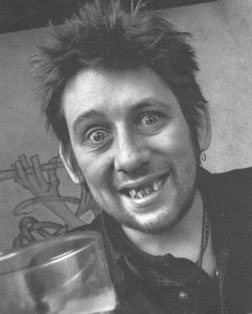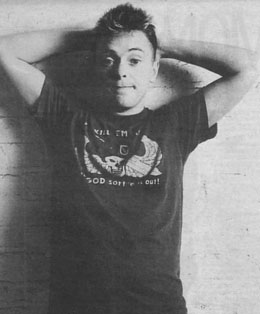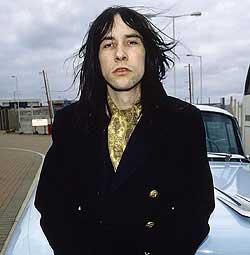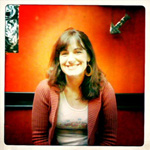Your favorite rockers pick their best-loved Clash songs
 As a child I was never immersed into The Clash through the listening habits of my parents (like Carl Barat talks of his parents doing, below). Mine were more into, say, records by Peter Paul and Mary, or some Keith Green — so I think I will always be trying to catch up when it comes to an encyclopedic knowledge of one of punk rock’s most important (and still relevant) groups. Because of this obvious character deficiency, I greatly enjoyed brushing up via this feature in The Observer (UK) as a variety of different rocker-types talk about what their favorite Clash song is and why.
As a child I was never immersed into The Clash through the listening habits of my parents (like Carl Barat talks of his parents doing, below). Mine were more into, say, records by Peter Paul and Mary, or some Keith Green — so I think I will always be trying to catch up when it comes to an encyclopedic knowledge of one of punk rock’s most important (and still relevant) groups. Because of this obvious character deficiency, I greatly enjoyed brushing up via this feature in The Observer (UK) as a variety of different rocker-types talk about what their favorite Clash song is and why.
From the Observer article “Why The Clash Are Still Rock Titans“
by Neil Spencer and James Brown Shane MacGowan, The Pogues:
Shane MacGowan, The Pogues:
“White Riot“
All the Clash singles come down to ‘White Riot’. It was the first single (it’s got ’1977′ on the B-side) and I’ll always remember the day I bought it, which was the day it came out. It was March ’77 and you could really see that the party was already over and we were rushing headlong towards the summer of hate. ‘White Riot’ and ’1977′ really gave off that feeling of paranoia, and the Clash were doing their up-against-the-wall stance in their stencilled suits. It had a great picture sleeve.
It was all about speed, staying out in sexually deviant or heavy-duty black nightclubs and massive creativity. It was also a piss-take of how pathetic white people are at standing up for their rights and having fun, whereas black people know how to do both. Both the Clash and the Pistols were masters of decadence. The essential theme behind punk wasn’t hate; it was complete contempt for the idea of the right to work or the need to do anything. It wasn’t ignorance, it was simply: ‘Fuck it, I don’t care. I just wanna have fun.’ And ‘White Riot’ says it all.
 Carl Barât, The Libertines/Dirty Pretty Things:
Carl Barât, The Libertines/Dirty Pretty Things:
“Tommy Gun“
The Clash were part of the nameless soundtrack to my early life. My mum and dad had these punk compilation tapes they used to play and ‘Should I Stay or Should I Go’ and ‘London Calling’ were on them. The band always appealed more than the Sex Pistols – they had more to say. ‘Tommy Gun’ evokes that age. It’s a product of the volatile climate of the late Seventies – all those references to terrorist organisations like Baader-Meinhof and the Red Brigade.
It’s like a punk adaptation of the Beatles’ ‘Revolution’: ‘Tommy gun, you ain’t happy less you got one!’ Fucking great. A mate told me a funny story about the ad lib near the end where Strummer sings: ‘OK, so let’s agree about the price, and make it one jet airliner for 10 prisoners.’ Apparently, he texted it to a mate who couldn’t figure out what the lyrics were and the next morning some heavies from MI5 turned up on his doorstep! That alone proves ‘Tommy Gun’ is as relevant now as it was back then.
 Pete Townshend, The Who:
Pete Townshend, The Who:
“Should I Stay or Should I Go“
My favourite Clash single is ‘Should I Stay or Should I Go’. I thought I’d heard it somewhere before. Listening to (the album) Combat Rock makes me feel like I’m 34 again and spring is in the cocaine.
We had a junior manager called Chris Chappel who was a huge Clash fan. I invited them on to the US tour after Chris convinced our senior manager they would be good. By the end of the tour, they had broken the US. I adore the Clash, as I adored the Sex Pistols. Not really comparable, but they both felt to me like bands who, like the Jam a little later, had travelled a route laid by the Who more than any other band.
The New York Dolls and the Ramones influenced British punk rock, but it was our simultaneous exaltation of rock, and indifference to it, that both bands emulated. So I have a personal pride in the Clash, as I do in the Sex Pistols and the Jam.
The Who recently played at the Brighton Centre and all I could think of while we played was that I had once played with the Clash on the same stage in 1981.
 Ian Brown, formerly Stone Roses:
Ian Brown, formerly Stone Roses:
“Bankrobber“
I was at the recording of ‘Bankrobber’. Me and my mate Pete Garner were walking down Granby Road in the middle of Manchester one day and we could hear these drums coming through the walls. Pete was a proper Clash fan and he was convinced it was them. Then Topper Headon walks out on to the street right in front of us!
He invited us downstairs into the studio to see what was going on. Mikey Dread was there and we got chatting. They were dead cool. Joe Strummer was sitting in the corner with a big, wide-brimmed hat on beneath this big grandfather clock, clicking his fingers in time to it. Paul Simonon asked us what our favourite film was and then said [affects authentic west London drawl]: ‘Mine’s Death Race 2000!’ Funny, the things you remember. Afterwards, we showed Johnny Green, their tour manager, the way to the record shop and he bought two copies of ‘London Calling’ – one for each of us. I’ll never forget it.
 Bernard Sumner, Joy Division and New Order:
Bernard Sumner, Joy Division and New Order:
“Rock the Casbah“
I was aware of the Clash when punk happened because that was what started us going, although I don’t think Joy Division were punk like that. I think we were something else that came after, that didn’t have a name.
I heard ‘Rock the Casbah’ in New York when we first started going there in the early Eighties after the demise of Joy Division. We were struggling a bit because Ian Curtis’s death meant we couldn’t go in that direction any more; we’d peaked in that sound. Clubs in New York were ‘new wave’, and the music was infinitely better than in England. There was the Peppermint Lounge, Danceteria, Hurrah’s, AM-PM. They weren’t playing commercial dance music but club tracks by English groups. The two absolute classics were ‘Tainted Love’ by Soft Cell and ‘Rock the Casbah’.
‘Rock the Casbah’ broke form. It really cut it in a club and showed me you can make club music that’s not cheesy. Here was a proper group, making proper music, but they were using traditional rock’n'roll instruments to make music that dominated a New York club scene. That was a massive inspiration for me.
 Stuart Pearce, England football hero & manager of Manchester City FC:
Stuart Pearce, England football hero & manager of Manchester City FC:
“Complete Control“
When I was 14, I was living with my mum and dad in Kingsbury, north west London. After school, I’d be straight up to the bedroom to get the records on. The walls had posters of all the bands I liked: the Clash, Stranglers, Stiff Little Fingers, Bowie. I had a Lurkers set list and a massive ‘Holidays in the Sun’ Pistols poster. I didn’t have a clue what I wanted to do back then – I still don’t now – I was just into music.
Back then, I didn’t want to hear any slow songs or ballads; I just wanted something fast and loud that I could sing along to and jump up and down on the bed with a baseball bat like an idiot. ‘Complete Control’ was the rawest song I had; everything I wanted was on it. I can still remember my old girl coming in and telling me to turn it down.
I’d play ‘White Riot’ before I went out to play, mainly at Forest; that was my musical peak, because I was captain. Brian Clough sort of turned a blind eye to it, really.
 Bobby Gillespie, Primal Scream:
Bobby Gillespie, Primal Scream:
“The Magnificent Seven“
This is the leading track on the album Sandinista!. I played it loads. When it came out, I was 18, living at home with my dad. I had a job in a print factory and the lyrics were pretty true to my life: ‘Ring ring it’s 7am, move y’self to go again.’
Most of the time I was so bored with it. I wanted to commit suicide, so the song portrayed that experience correctly. The song’s about the futility of work – it voiced the experience I was going through. Living in a cage, imprisoned with no real future, that song gave me the courage to give up work. I always remember the lyrics because of that.
I loved Chic, and this sounded like ‘Good Times’. It sounded like a punk version of Chic. It’s a rebel song you can dance to.
The album was one of the best, really brave, coming after London Calling, which everyone was saying was a rock masterpiece. Then they come out with this triple album full of disco, psychedelia, country, dub, everything.
It’s an amazing record, great energy, great remixes, a truly wild record with some of Strummer’s greatest lyrics.
 The Edge, Guitarist, U2:
The Edge, Guitarist, U2:
“(White Man) In Hammersmith Palais“
The Clash’s first album always sounded a bit rough to me. It was only when I saw the band live on their ‘Out of Control’ tour that I found out how potent they could be. It was 21 October 1977 in Trinity College, Dublin – it was a tribal gathering and it had a seismic impact on the Dublin subculture.
‘White Man in Hammersmith Palais’ was the first song that revealed their political depth. Written after a disappointing reggae gig at the Hammersmith Palais featuring Dillinger, Leroy Smart and Delroy Wilson, it mocks both the gun-toting braggartry of the reggae artists and the shallow, attention-seeking UK punk rockers for missing the real danger: the rise of the neo-Nazi movement.
 Steve Jones, Sex Pistols and Indie 103.1 FM, LA:
Steve Jones, Sex Pistols and Indie 103.1 FM, LA:
“London Calling“
I loved the Clash. They were formed because of seeing the Pistols, so they were never seen as a threat. The Pistols were number one and the Clash were number two, even if that was perceived to have changed further along the road. I like the way they played because it was the same style as I’m from, the same school of glam. Mick Jones was coming from the same place I was. I went up to Birmingham and played with them. It was all good in my book.
‘London Calling’ was their ‘Anarchy in the UK’. I thought it was a depressing song but significant, because of the lyrics. You know, history gets twisted by those who weren’t there. The Clash, they were there, we were there. I’ve had Mick on the blower for the radio show. And Joe would leave me these weird messages when he was alive, at 5am, saying how I was his fave guitar player. They were great guys. I liked them.




 Name: Heather Browne
Name: Heather Browne
Great great post.
Bruce — November 1, 2006 @ 8:15 pm
I agree with Bruce.
- Steve
rocknrollstar — November 1, 2006 @ 9:26 pm
I agree
enjoy reading your posts.
Jay — November 1, 2006 @ 9:48 pm
Ah the Clash…as the youngest of four children they were the band that set me on a different musical path to that of my elder siblings. While I can still thrill to ‘Anarchy in the UK’ and the Pistol’s sheer velocity, the Clash directed their anger and energy. I still have a ticket stub for a gig at London’s Lyceum Ballroom stuck to the cover of my copy of London Calling as a reminder of being immersed in the sweat and energy of the mightiest rock’n'roll band of their generation. Joe Strummer’s passing was so sad because he was a survivor.
Richard — November 2, 2006 @ 3:30 am
Punk Rock always was a waste of time.
Anonymous — November 2, 2006 @ 7:04 am
The Clash were always so good.
The last few Strummer solo albums reminded everyone just how good he / they were. Too bad B.A.D never were very consistent. A good single here or there, but you had to skip around to find them.
The bass lines were so cool and had such a grove… I never read about that.
Nice post…
The pix of Shane makes him look insane.
-SINEDDIE
SINEDDIE — November 2, 2006 @ 7:38 am
I have a question in regards to your ads. Who do you good through for that?
Let me know. Thanks!
-Jon
Dance Hall Hips — November 2, 2006 @ 9:41 am
By ‘good through’ I meant go through
Dance Hall Hips — November 2, 2006 @ 9:42 am
My mother ( being from Manchester) knew Iain Brown as a teen prior to the stone roses. His band ‘The Patrol’ practiced in her garage.
It has its perks as me and a mate got front row at one of his gigs
Ament — November 5, 2006 @ 5:33 am
I saw The Clash 4 times between ’77 and ’79 and can still feel the thrill of waiting for them to come on and the explosion when they started up.
I met Joe Strummer at a sigining for his last but one album and he was a really nice, cool guy. I was so pleased that my hero turned out to be cool in real life.
Steve — April 15, 2007 @ 4:14 am
Thank you.
dickvandyke — April 15, 2007 @ 2:25 pm
thankyou
Anonymous — October 31, 2007 @ 6:49 am